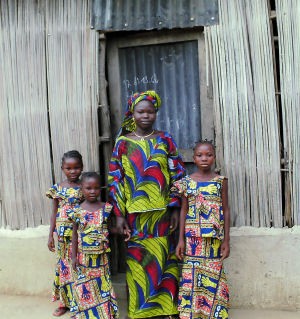Child sponsorship background from Abomey-Calavi, Benin
 SOS Children's Village Abomey-Calavi
SOS Children's Village Abomey-Calavi
SOS Children's Village Abomey-Calavi was built on a plot of land that had been made available by the Benin authorities and is near to the town Ganvié with its lagoons, where many people still live in pile dwellings. Calavi is 17 km from the business capital Cotonou. Unemployment is very high and living conditions are poor in this area which has very little industry. The majority of families have many children and are not in the position to provide for all of them. Because of the small number of schools for a large number of children under the age of eighteen and high school fees, it is often not possible for the children to go to school regularly.
SOS Children's Village Abomey-Calavi is located on five-hectare plot of land. It has eleven family houses and can house up to 110 children. It has an administration block, a village director's house and a guest house, which is available for the organisation's staff to use for various training programmes. It also has a community hall for the many events that are held and village activities, a workshop and parks with flowers and fruit trees. It is due to the warm and humid climate that the village's vegetable garden flourishes and contributes towards meeting the needs of those who live in the village.
Other SOS Projects in Abomey-Calavi
The SOS Nursery School, which is also located within the grounds of the SOS Children's Village, can also be used by children from the neighbouring areas. It was opened in 1987 at the same time as the SOS Children's Village and can take up to 100 children. It has five classrooms (one of which is for the individual tuition of children with learning difficulties) and a canteen where the children eat their lunch.
Between 1987 and 2002, two SOS Schools were built in SOS Children's Village Abomey-Calavi, which are attended by both children from the village and, in view of school problems in Benin, children from neighbouring areas.
The SOS Primary School, which was built at the same time as the village, was opened in 1987. It consists of 12 classes, has a capacity of up to 480 school children and has a sick ward, a canteen, an administration building and a special room for private lessons. Construction work on the SOS Secondary School, which was planned for 1998, began in 2000. The first school children started there in 2002. The school has a capacity of 420 children, consists of 14 classrooms and has several art and music workshops, a library, a boarding school for children on the international exchange programme, a canteen and several administration buildings.
An SOS Youth Home is designed to encourage the young people to become independent and to make it easier for them to be integrated into society and the working world. It was opened in October 2003 and makes it possible for the young people to prepare for an independent life under the guidance of educators.
To give SOS mothers and SOS staff the opportunity to receive ongoing training, an SOS Vocational Training Centre was opened in Abomey-Calavi in March 2006, which is currently attended of about 200 mothers and employees, who can also stay in three guest houses. Training takes place in the classrooms and a community room, a multi-purpose building and a canteen are also available.
Background to Abomey-Calavi
Abomey-Calavi is a city in in the Atlantique Department of Benin. It is a suburb of Cotonou and is located approximately 18 km from the city centre of Cotonou. Its principal university is the Université d’Abomey-Calavi. The main cities are Abomey-Calavi itself and Godomey to the south. The commune covers an area of 650 square kilometres and as of 2002 had a population of more than 300,000 people.

 Return to Schools Wikipedia Home page…
Return to Schools Wikipedia Home page…
